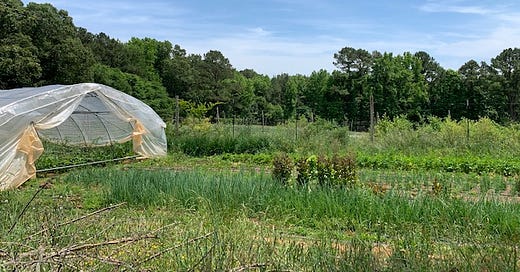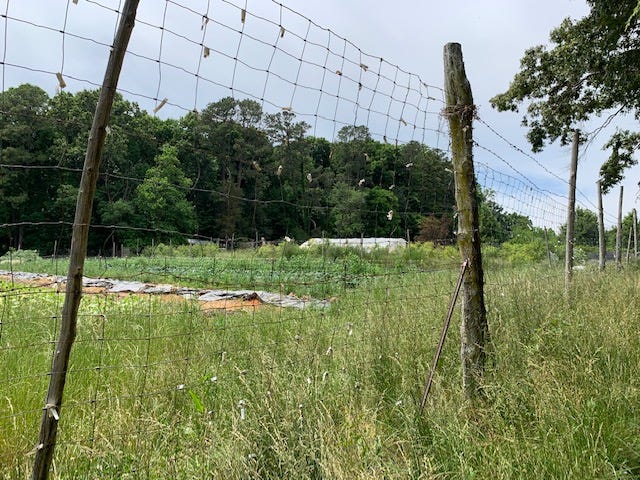Yesterday Bea and I went on a tour of In Good Heart Farm, the farm where we get our CSA, a weekly selection of vegetables they’ve just harvested. Ben Shields and Patricia Parker grow their vegetables and fruit organically, not using any pesticides or synthetic fertilizer. But organic farming is more than just the absence of harmful chemicals. It’s also about improving the soil naturally, rotating crops, providing places for pollinators to live and do their work—and learning, constant learning.
Ben and Patricia explained how they pile up sticks, pruned from their orchards, to make a pollinator hedgerow between the crops, which will improve biodiversity within the garden as it breaks down into soil. How they wait to mow the grass around the apple trees to take advantage of the symbiotic, mycelial relationship between the trees, the soil fungi, and the grasses. How they learn from other farmers and orchardists doing the same work. Their kids, Bea, and the other children who’d come on the tour played in the orchard and picked potato bugs while the adults listened.
Many small farms have to heal the land first, because it has been farmed conventionally, neglected, or because of pollution and agribusiness. I grew up on a large, monocultural farm in Virginia—Hayes Farm, which grew soybeans on more than a thousand acres. My parents weren’t farmers, but rented a house there, because it was near the river, and also near Kings Dominion, where they both worked (my dad building roller coasters, my mom sculpting exhibits). My mom had to move the garden she tilled far from the soybean crops, because they were so polluted by pesticides. The last time I drove by Hayes Farm it had been turned, at least in part, into a gravel pit.
I’d just seen Minari the night before. I loved it, start to finish, especially Youn Yuh-jung’s marvelously unconventional grandma, but my favorite parts of that film (about a Korean-American farm family in Arkansas) were the child’s-eye shots of the fields. The beautiful golden light, the breeze swaying the grasses, the butterflies flitting across the tops. The land looks alive, as it is, and I love especially that you can’t tell if these idyllic shots are five-year-old David’s point of view, or his father’s—or maybe an omniscience that recognizes the beauty of a place that is often overlooked or stereotyped.
Minari takes place in the 1980s, when many small farms were going under and factory farms and monoculture ruled, but the farm practices depicted are more like Ben and Patricia’s. Jacob Yi, who sifts the soil between his fingers and tells his wife it’s why he chose this land (“because of the dirt color?” she asks, exasperated), grows a wide variety of Korean vegetables using, as far as I can tell, sustainable practices. Like Ben and Patricia, he is growing food for people, not livestock, considering what people (especially Korean immigrants like himself) will want to eat. To find a market for his food, he packs up a box of vegetables—a selection of all he grows—and carries them around like the precious cargo they are. Though Monica, his wife, is understandably more focused on the health of their son, who has a heart condition, we see (by the end) a connection of healing—land, food, body.
It was interesting to me that Jacob Yi refers to his farm often as a garden, and Ben and Patricia talk about their garden too. In this garden of about two acres, In Good Heart grows more than one hundred different types of vegetables and fruit. They have another three acres of orchards, and are at local farmers’ markets most of the year with their seasonal produce.
“Look, you can grow a lot of stuff on a little bit of land,” LaShauna Austria told me, back in December. LaShauna, who runs Kindred Seedlings Farm in Alamance County, recently bought twenty acres, but she started her seedlings and culinary herb business in her own suburban backyard (a quarter acre!). I don’t know about gardening our five acres (our property is so wooded and rocky, so we’re more about foraging—though I’m open to suggestions!), but I’m grateful for these small farmers, the educational and social justice work they do (LaShauna is also an activist and community organizer; Patricia’s newsletter got me into mushrooming), and the chance, by supporting them, to be part of the healing of the land.
“It always comes back to that Wendell Berry quote, ‘eating is an agricultural act,’” Patricia said, at the end of the tour. I looked behind me, and Bea was biting into an unripe apple (sorry, Patricia and Ben!). In the fall, we’ll get their ripe apples in our farm share—maybe Bea will remember the sour apple, or climbing the tree where it grew.






This is great. Loved learning about your family's connection to King's Dominion and your childhood experience with the land. We fight invasives here in Rhode Island, where development (and golf) is a bigger threat than corporate farming. A patch of Japanese knotweed infested a full acre+ of my family's place and we are "re-wilding" it with natives, but the process of eliminating the knotweed, which is not unloved by bees and birds, is daunting. It is going to take a lot of love to undo what we have collectively done... but I love reading about people like Ben and Patricia who are doing it.